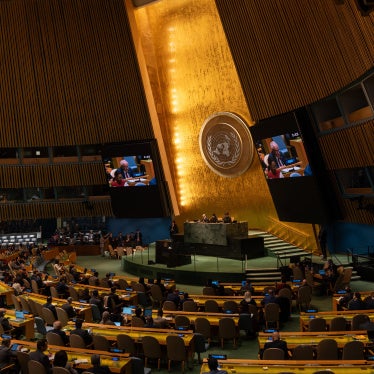Human Rights Watch welcomes the opportunity to provide comments on the U.N. Norms on the Responsibilities of Transnational Corporations and Other Business Enterprises with regard to Human Rights (the Norms).
For more than a decade, companies have come under scrutiny by nongovernmental organizations (NGOs), the press, the public, and governmental and multilateral organizations because of their conduct throughout the world. That scrutiny has led a number of companies to develop voluntary codes of conduct that define their responsibilities. In some cases, industry standards have been developed, such as the policies and procedures under the Fair Labor Association (FLA) or the Voluntary Principles on Security and Human Rights in the Extractive Industries. Governments and NGOs have also participated in such industry standard-setting efforts.
While these efforts have been positive, there are still major challenges in holding corporations accountable. Many initiatives apply only to specific industries and do not have widespread applicability. Companies’ voluntary codes of conduct vary and often have differing standards. For example, some codes include respect for freedom of association while others do not. And in every case, codes are voluntary. Some initiatives, such as the FLA or the efforts of Social Accountability International (SAI) do have detailed independent monitoring mechanisms, but companies are not required to join such efforts.
Within this context, the Norms can play a very important role in standardizing all companies’ responsibilities and the procedures to ensure compliance. The Norms recognize that the fundamental obligation for upholding human rights lies with governments, but that companies do have responsibilities as well. The Norms, along with their commentary, are currently the most authoritative and comprehensive interpretation of companies’ responsibilities under international human rights and humanitarian law. Moreover, the Norms incorporate some of the best guidelines developed through voluntary initiatives. As such, the Norms provide guidance for any company seeking to develop a code-of-conduct and provide a benchmark for those companies that already have a code.
Making the Norms a benchmark would help solve the problem of the proliferation of codes by providing a basis for the assessment of existing and future codes. For example, unlike the Norms, few codes explicitly call for independent monitoring to ensure compliance. Revising codes to this higher standard would make them more credible and effective.
The Norms also begin to close a loophole because they apply to all forms of business and not only transnational corporations. Historically, one criticism of voluntary standards and initiatives is that they only apply to transnational corporations. Some of the companies that adopt voluntary codes of conduct have complained that they suffer a comparative disadvantage when their competitors do not adopt such codes. The Norms, however, apply equally to all businesses. That is an important step forward since any business enterprise can become complicit in violations of human rights. More importantly, perhaps, the widespread applicability of the Norms should be useful for multilateral institutions such as the World Bank or private investors since such actors can use the Norms to assess any company’s human rights performance. Similarly, consumers and the public now have a single standard with which to assess companies. Only the Norms provide this single reference for so many interested parties.
Finally, Human Rights Watch continues to believe that there is a need for binding standards to constrain corporate actions that could impinge on the enjoyment of human rights. Although the Norms are not a binding set of standards and do not themselves have the force of law, they could serve as useful guidance for any government that chooses to develop laws for corporate accountability. Their analysis and commentary could also provide the conceptual basis for a binding international instrument on corporate responsibility since the Norms are an authoritative interpretation of the responsibilities of corporations under international human rights law. At some point in the future, we hope that the international community will take steps to develop such an international instrument.
We strongly support the Norms and view them as an important step forward for corporate accountability. We encourage the High Commissioner to include in its report:
- Support for the U.N. Norms and the important work of the Sub-Commission on the Promotion and Protection of Human Rights.
- An analysis of corporations that are attempting to implement or otherwise utilize the U.N. Norms as well as a call for corporations to undertake such efforts.
- Support for continuing and extending the consultation process for NGOs, governments, and companies in order to further strengthen the Norms.
- Examination of possible ways that governments, multilateral institutions, and financial institutions could implement or otherwise use the Norms in order to promote corporate accountability.
We welcome the Norms and view them as an essential element of corporate accountability. We hope to have more opportunities to participate as this process evolves.







